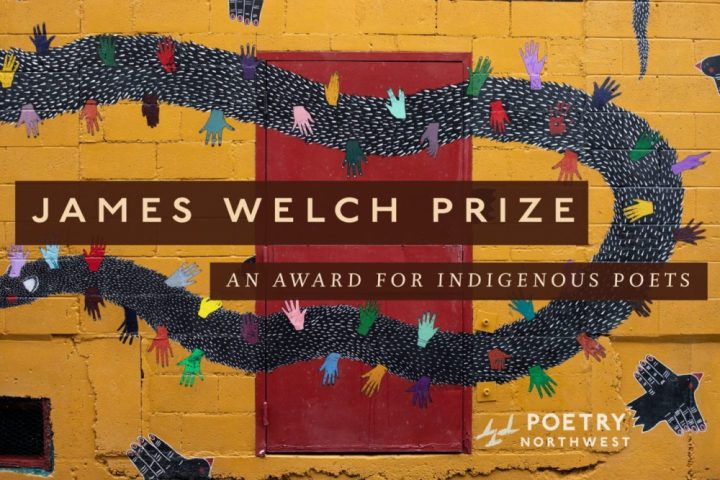Although this event has passed, you can still purchase tickets now through Friday, November 12, at 7:30 p.m. (PT). The event will be viewable until 11:59 p.m. on Friday, November 12.
The inaugural James Welch Prize reading, celebrating two Indigenous poets from the U.S., is presented in partnership with Hugo House and Poetry Northwest, featuring judge Sherwin Bitsui and winner Kenzie Allen. Although this event has passed, you can still purchase a digital pass to view it through Nov. 12 at 7:30 p.m. (PT). You’ll have until later that evening, 11:59 p.m. on Nov. 12, to watch it.
Sherwin Bitsui is originally from White Cone, Arizona, on the Navajo Reservation, and is the author of three collections of poetry: Dissolve (Copper Canyon, 2018), Flood Song (Copper Canyon), and Shapeshift (University of Arizona Press). He is Diné of the Todích’ii’nii (Bitter Water Clan), born for the Tlizílaaní (Many Goats Clan), and holds an AFA from the Institute of American Indian Arts Creative Writing Program and a BA from University of Arizona in Tucson. His recent honors include a 2011 Lannan Foundation Literary Fellowship and a 2011 Native Arts & Culture Foundation Arts Fellowship.
Bitsui is also the recipient of 2010 PEN Open Book Award, an American Book Award, and a Whiting Writers Award. Bitsui has published his poems in Narrative, Black Renaissance Noir, American Poet, The Iowa Review, LIT, and elsewhere. Steeped in Native American culture, mythology, and history, Bitsui’s poems reveal the tensions in the intersection of Native American and contemporary urban culture. As an ecopoet, his poems are imagistic, surreal, and rich with details of the landscape of the Southwest.
Kenzie Allen is an Assistant Professor of English at York University, specializing in Creative Writing and Indigenous Literatures. Her research centers on documentary and visual poetics, literary cartography, and the enactment of Indigenous sovereignties through creative works. She is a descendant of the Oneida Nation of Wisconsin. Kenzie received her PhD in English & Creative Writing at the University of Wisconsin-Milwaukee, where she was an R1-Advanced Opportunity Program Fellow, Chancellor’s Award recipient, and a TA in American Indian Studies. She received her MFA in Poetry from the Helen Zell Writers’ Program at University of Michigan (2014), and her BA in Anthropology from Washington University in St. Louis (2010).
Allen’s poems have appeared in places like The Iowa Review, Indiana Review, Narrative Magazine, Black Warrior Review, Boston Review, Best New Poets 2016, and she is the managing editor of Anthropoid and the founder of Apiary Lit.
Previously, Kenzie has contributed to technology startups as a web, product, and ui/ux designer. She has served as a Student Representative for the High Plains Society for Applied Anthropology, and as an archivist and volunteer fire lookout for the Sand Mountain Society.
Originally from West Texas, she now shares time between Trondheim, Norway, and the Oneida reservation in Green Bay, Wisconsin. She is at work on her first manuscript in poetry, a multimodal chapbook of Texas poems, and a memoir about blood quantum. Find Allen’s work here.
Jennifer Elise Foerster, our Q&A moderator for the evening, is the author of two books of poetry, Leaving Tulsa (2013) and Bright Raft in the Afterweather (2018), and served as the Associate Editor of the recently released When the Light of the World Was Subdued, Our Songs Came Through: A Norton Anthology of Native Nations Poetry. She is the recipient of a NEA Creative Writing Fellowship, a Lannan Foundation Writing Residency Fellowship, and was a Wallace Stegner Fellow in Poetry at Stanford. Her poetry has recently appeared in POETRY London, The Georgia Review, Kenyon Review and other journals. Jennifer currently teaches at the Rainier Writing Workshop and is the Literary Assistant to the U.S. Poet Laureate, Joy Harjo. Foerster grew up living internationally, is of European (German/Dutch) and Mvskoke descent, and is a member of the Muscogee (Creek) Nation of Oklahoma. She lives in San Francisco.
